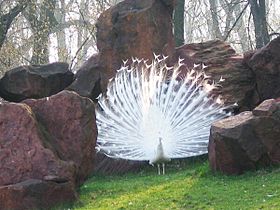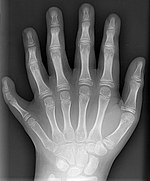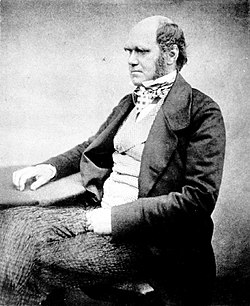Talk:Natural selection
| Workgroup category or categories | Biology Workgroup [Categories OK] |
| Article status | Developing article: beyond a stub, but incomplete |
| Underlinked article? | No |
| Basic cleanup done? | Yes |
| Checklist last edited by | Bill James 16:17, 29 March 2007 (CDT) |
To learn how to fill out this checklist, please see CZ:The Article Checklist.
Plan for Article
This article bears an important relationship to many other articles of the Citizendium pilot. It is probably best updated so that a user can reference it appropriately both from genetic articles at a higher academic level, and hobbyist articles on breeds of animals and varieties of plants on a practical level. Nancy Sculerati MD 08:06, 5 January 2007 (CST)
Natural selection: biology
This article is about natural selection as a biological theory. The wikipedia article, which was very long, also included information theory and social darwinism, as well as evolution. As almost none of what was written about these topics was easily comprehensible, I deleted them. Nancy Sculerati MD 17:02, 5 January 2007 (CST)
- The feeling among many of the WP editors as been that this is the best of the evolution articles, relatively little affected by the continual struggle against intelligent design and unintelligent vandalism. How much further do we drill down until we get to the actual scientific articles? There are many accessible and books about the genetics of individual pet and agricultural animals. I suggest the place for them will be the articles about the individual animals.
- The discussion of the social & philosophical aspects is a summary, and fuller accounts appear several places in WP, and I will try to find them and combine them into a single article, but there should still be a sentence here leading to it. I am not certain about the title.
- The physical aspects, interwoven as they are with Behe's argument based on the second law of thermodynamics, also needs treatment. I think its done fuller elsewhere, and again it should be tracked down. and again I'm not sure about a good title. Again, it should be referred to here. The existing paragraph may have suffered from over-condensation. It may be better to put these in after the article itself has been written.
- The material about history is still included, and I have added the missing subheadings. Probably this too will eventually be a separate articles, but I do not know if we need separate articles on the history of nat.sel., and the history of evolutionary thought.
- I changed the general books to come first, and I do not like called the more advanced ones "technical" To me, 'technical" in a biological setting implies either technique, or the applications, such as agriculture, medicine, and biomedical engineering. That doesn't mean I like "more advanced"--think of it as a place holder. DavidGoodman 18:19, 5 January 2007 (CST)
- I just looked, and the WP article is experiencing further work from some good people. I am collating it tonight to incorporate improvements in ours , and then it will need checking every month or so. We should use good work where we find it. DavidGoodman 18:22, 5 January 2007 (CST)
added from edit
- The feeling among many of the WP editors as been that this is the best of the evolution articles, relatively little affected by the continual struggle against intelligent design and unintelligent vandalism. How much further do we drill down until we get to the actual scientific articles? There are many accessible and books about the genetics of individual pet and agricultural animals. I suggest the place for them will be the articles about the individual animals.
- The discussion of the social & philosophical aspects is a summary, and fuller accounts appear several places in WP, and I will try to find them and combine them into a single article, but there should still be a sentence here leading to it. I am not certain about the title.
- The physical aspects, interwoven as they are with Behe's argument based on the second law of thermodynamics, also needs treatment. I think its done fuller elsewhere, and again it should be tracked down. and again I'm not sure about a good title. Again, it should be referred to here. The existing paragraph may have suffered from over-condensation. It may be better to put these in after the article itself has been written.
- The material about history is still included, and I have added the missing subheadings. Probably this too will eventually be a separate articles, but I do not know if we need separate articles on the history of nat.sel., and the history of evolutionary thought.
- I changed the general books to come first, and I do not like called the more advanced ones "technical" To me, 'technical" in a biological setting implies either technique, or the applications, such as agriculture, medicine, and biomedical engineering. That doesn't mean I like "more advanced"--think of it as a place holder. DavidGoodman 18:19, 5 January 2007 (CST)
- I just looked, and the WP article is experiencing further work from some good people. I am collating it tonight to incorporate improvements in ours , and then it will need checking every month or so. We should use good work where we find it. DavidGoodman 18:22, 5 January 2007 (CST)
Removed during cleanup



Orphaned text
This didn't really fit where it was but I suspect that, with some cleanup, this is useful information. I'm moving it here for correction:
After reading Darwin, Herbert Spencer introduced the term survival of the fittest; this became popular, and Wallace marked up an entire edition of The Origin of Species, replacing every instance of natural selection with Spencer's phrase. Although the phrase is still often used by non-biologists, modern biologists avoid it because it is tautological if fittest is read to mean functionally superior.
Jacob Jensen 22:24, 2 April 2007 (CDT)
Incorrect
Text here was removed by the Constabulary on grounds of civility. (The author may replace this template with an edited version of the original remarks.)
- I've changed it. Not a biologist, so I'll leave the rest alone. I changed it because I didn't understand the previous sentence at all. John Stephenson 04:12, 15 July 2007 (CDT)
Why reverted last sentence of the first par
The last two sentences of the first paragraph now read: "Although there are differing definitions of the term natural selection, most biologists agree that this process is completely verifiable as far as micro-evolution, and a number of biologists hold to a more Darwinian approach involving macro-evolution. Put in a general way, natural selection is thought to explain why all life evolves at some fundamental level." Tom (Major--new guy, welcome Tom) changed the latter sentence to read, "Natural selection is thought to explain how all the varieties within the species originated (ex. all the varieties of dogs)." This completely ignores the previous sentence; the last sentence was a gloss on the second-to-last sentence. --Larry Sanger 10:31, 5 September 2007 (CDT)
- Well, it doesn't disregard it completely, just half of it. The last sentence only covers the micro-evolution view, not the macro. The last sentence was simply mentioning that a number of biologists hold the macro-evolution view of adaptation which eventually develops into brand new features never before seen in the genes, while the natural selection process is not capable of doing that. It only selects from what is available in the genes. Sometimes mutations happen that delete or make more of what is already available, but not brand new, or never-previously-existing, features. :-) --Tom Major 11:00, 5 September 2007 (CDT)
Well, my point is simple: the last sentence explained the fact that some biologists "hold to a more Darwinian approach involving macro-evolution." Let me change the punctuation to make this clearer. --Larry Sanger 11:17, 5 September 2007 (CDT)
Well, (welcome Tom), I've looked at the first paragraph and frankly it had become pretty incomprehensible over time and wrong in places, so I'm not at all surprised that you thought it was worth a tinker. I've rewritten it. Micro and macro evolution are complex concepts that I don't think belong up front.Gareth Leng 11:26, 5 September 2007 (CDT)
- Biology Category Check
- General Category Check
- Category Check
- Advanced Articles
- Nonstub Articles
- Internal Articles
- Biology Advanced Articles
- Biology Nonstub Articles
- Biology Internal Articles
- Developed Articles
- Biology Developed Articles
- Developing Articles
- Biology Developing Articles
- Stub Articles
- Biology Stub Articles
- External Articles
- Biology External Articles
- Biology Underlinked Articles
- Underlinked Articles
- Biology Cleanup
- General Cleanup
- Cleanup